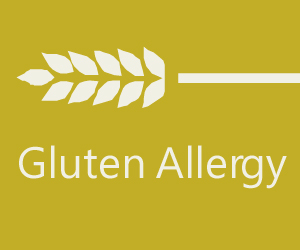The symptoms of a gluten allergy (Celiac disease) or intolerance result from the inability of the small intestine to absorb nutrients from food as it is digested. Gluten is a protein found in grains such as wheat, rye, barley and others. Gluten causes damage to the villi of the small intestine and can lead to malnutrition. Villi are small, finger-like projections in the small intestines that absorb nutrients as the food passes through. Gluten causes damage by irritating, flattening and shortening the villi. Damaged villi cannot absorb nutrients, resulting in malabsorbtion of nutrients and malnutrition.
Basically, the food your child eats is going in one end and out the other without stopping to leave behind the necessary vitamins, minerals and calories for proper nutrition. The small intestine is where iron, folic acid, calcium and Vitamins K, A, D and E are absorbed. Imagine a train with many cars filled with vitamins, mineral and calories. Instead of making its scheduled stops at every town along the track, it races from beginning to end taking its cargo with it and dumping it at the end of the track. The towns in between are going hungry and are not thriving.
Some possible symptoms of a gluten allergy and/or intolerance are:
- Liquid, foul-smelling diarrhea
- Headaches
- Blistered rashes on stomach, buttocks, arms, legs, hands, feet (The medical term for this is Dermatitis Herpetiformis – DH)
- Abdominal cramping
- Distended abdomen
- Weight loss
- Anemia
- High fever
- Irritability
- Flatulence (gas)
- Vomiting (at times projectile vomiting)
- Inability to sleep through the night
- Listlessness
- Low height and weight gain
- Dark circles under the eyes
- Lack of muscle definition
- Constipation
Unfortunately, the above symptoms can also be caused by other illnesses and diseases. If your child has a number of the above symptoms for any length of time, please consult with their doctor. If left untreated, a gluten allergy and/or intolerance can cause permanent damage to the small intestine. It can become life-threatening and can cause other conditions such as:
- Osteoporosis and other bone diseases
- Bone “pain”
- Weight loss
- Internal hemorrhaging
- Central and peripheral nervous system disorders
- Anemia
- Delayed start in menstruation
- ADD / ADHD type symptoms
- Lack of dental enamel formation
The Author:
Joyce Nielsen has over 30 years of experience researching and cooking for food allergies and special diets. She believes in a holistic approach to health that deals with the whole person rather than just treating symptoms. She is inspired to write for others with food allergies in order to share her experiences and offer insight.
